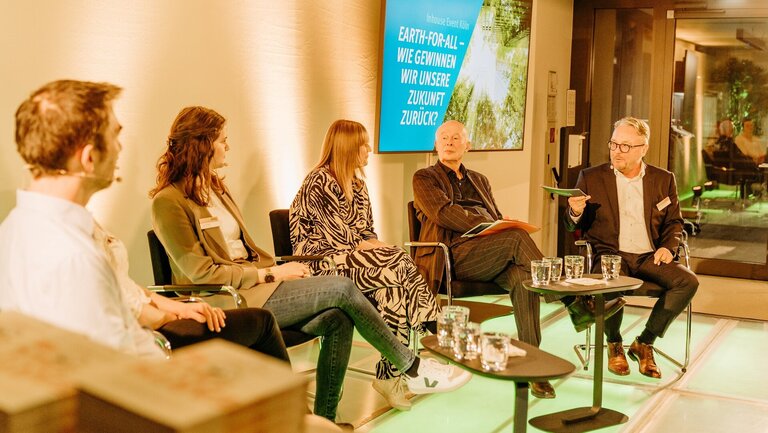Blockades in front of lignite power stations, protests on urban highways or voluntary decisions to avoid air travel. We all know about the harm caused to the climate by fossil energy sources and our common modes of transport. But people do not yet sufficiently realize the toxic effect of the construction sector on the climate, although about 40 percent of global greenhouse gases is attributable to the construction industry. In addition, half of the world's waste results from the construction or demolition of buildings. What must be changed as quickly as possible, and what opportunities can this create? Yesterday, these questions were addressed by the climate researcher professor Hans Joachim Schellnhuber and the moderator and influencer Louisa Dellert, who is known for her work on sustainability topics, at Drees & Sommer’s Earth for all inhouse event in Cologne.
Building without creating waste for the future? In its new building The Cradle, the project developer Interboden shows what is already possible in an office building based on the recycling principle: a core built with recycled concrete, a modular timber load-bearing structure and a striking wooden façade. As far as possible, natural materials suitable for recycling are used in the Dusseldorf’s media harbor. Compared with traditional structures, carbon emissions are reduced by around 40 percent. Moreover, the energy efficient building design will represent a valuable repository for materials. The client is supported by the environmental consultants of EPEA, a subsidiary of Drees & Sommer SE who specializes in construction and real estate advisory services. This building anticipates the future with its digital building resource passport, which is like a climate driving license for properties and is also demanded by the German Federal Minister for Housing, Urban Development and Building, Klara Geywitz. Sooner or later, the regulations which are planned within the European Union and at a national level will force the industry to create circular processes for materials. This means that when buildings are later demolished, they will be treated as repositories of raw materials for new buildings.
‘In the new construction sector, for example, our industry has already reached a very good level with plus-energy houses and many other energy efficiency standards and initiatives. We are also developing and strengthening the Cradle to Cradle approach, a circular concept for materials in all branches of industry for which the construction sector is playing a pioneering role. Our major problem lies in existing buildings. Here, conversion and alteration must not be synonymous with demolition,’ explains Stefan Heselschwerdt at the Earth for all event in Cologne. As a Partner at Drees & Sommer, he heads the company’s team in the German federal state of North Rhine-Westphalia.
‘Many existing buildings are not suitable for the future energy requirements. This is not only expensive for the residents due to the dramatic rise in gas and energy prices. It will become really painful when the devastating consequences for the climate are clearly seen. It is already high time to introduce a comprehensive sustainable construction revolution,’ says professor Hans Joachim Schellnhuber, founding director of the Potsdam Institute for Climate Impact Research and founder of Bauhaus Erde gGmbH.
The influencer Louisa Dellert agrees that a willingness to change is an important ingredient to halt global warming and ensure a sustainable way of life. ‘A sustainable lifestyle is one way to take responsibility and work towards the protection of the climate and a healthy environment.’ She says that every person must realize where they can take responsibility. She adds that nobody can save the global climate alone – that this requires a joint major effort.
Find more information in our press release.
